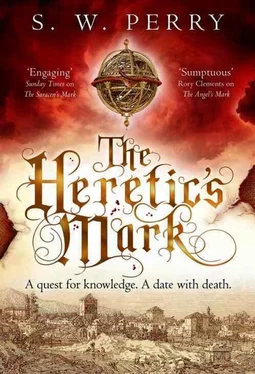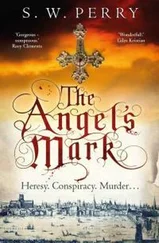‘A man in a grey coat – which, according to Signor Purse, had no bloodstains on it.’
‘Bianca and I were followed from Reims by such a man.’
‘That doesn’t make him an assassin, does it? Besides, why would anyone follow you and that comely wife of yours all the way from France and then start murdering associates of Signor Purse – in Padua? It makes no sense.’
‘I don’t know,’ Nicholas confesses. ‘But I fear Hella could be in danger. Indeed, so could anyone in Bruno’s new guild. Speaking of Bruno, have you seen him of late?’
‘Not since this morning, but there’s nothing remarkable in that.’
‘I still think you should be careful.’
Galileo studies the bottom of his empty wine cup. ‘I thought the English were supposed to be unexcitable fellows.’
‘Are you not troubled by the possibility I might be right?’
The mathematician shrugs. ‘In all honesty, I have had little to do with Bruno’s wild scheme, other than to lend my name to it. It was Matteo who put in the hard effort. Besides, I’m accomplished at avoiding characters who wish me ill. I’ve been dodging my brother-in-law over my sister’s dowry for months. He still hasn’t caught me, and let me tell you: Signor Benedetto Landucci is a very persistent fellow.’
‘A dowry can’t stab you between the ribs, Signor Galileo.’
Galileo gives a snort of appreciative laughter. ‘Maybe not, but I’m safe enough here. Who in their right mind would attack a peaceable fellow like me, in the middle of the celebrations of the Holy Rosary? Unless he was a creditor, of course. There’s a whole army of those.’ He sets down his cup. ‘Talking of credit, mine’s run out. Fancy more wine? I’ll pay you back tomorrow.’
Exasperated by the mathematician’s sangfroid , but at the same time amused by his audacity, Nicholas calls to a waiting servant, orders another jug and pays for it. From across the Piazza dei Signori comes a sudden thunder of drums. Looking up, Nicholas sees the liveried bearers hoisting the Venetian galley aloft. He rises from the table.
‘Not going to help me drink it, Master Physician?’ Galileo asks in surprise.
‘I’m supposed to be marching with Bruno. I’ve probably missed him in this fog. He’ll be wondering where I am.’
Galileo fills his cup and raises it in a toast. ‘You’re a good fellow, Niccolò – for an English heretic. But I think you’re seeing goblins hiding under tables.’
‘Perhaps I am,’ Nicholas says with a smile, though underneath he feels a sense of unease. ‘But I’d still counsel you to take care. There may be people here tonight more dangerous than brothers-in-law.’

In the Piazza dei Signori and the adjoining side-streets the members of the city guilds have assembled beneath their banners. The sound of drumming fills the night. There is expectation in the foggy air. Nicholas is reminded of an army flushed with the thrill of conquest, preparing to march out for the final battle, exultant.
He does not share this exhilaration. The hour has come, and still there is no sign of Bruno Barrani. Worse still Luca has arrived, and he has come alone. ‘But the Signora was not in your chamber,’ he protests, looking about uneasily as though he has mislaid something precious entrusted to his care. ‘I knocked, but she had gone. I assumed she had made her own way here.’
‘It’s not your fault, Luca,’ Nicholas says, taking in the faces gathered beneath the banner of dark-blue silk emblazoned with its shooting star. They drift across his vision like half-remembered acquaintances from the past: Alonso, Mirandola the clockmaker, Pasolini the carpenter, the Corio brothers, the engraver Carlo Pomponazzi, and a gaggle of accompanying apprentices and servants. There must be almost a score of them. But no Bruno. No Bianca. The unease he’d experienced when leaving Galileo Galilei in the Piazza dei Signori a few minutes ago suddenly has the weight of lead about it.
The guild ahead of them in the procession is hoisting its banners and preparing to follow the sound of the drums. The crowd lining the walls breaks out into sporadic clapping and cheering. The Arte dei Astronomi must either march or stand down.
In the event it is Alonso – entrusted by his master with the banner – who takes command. He has the little group form into an orderly file, two abreast. Then, as the guild in front begins to stride out, he calls out in what he imagines is the voice of a Caesar, ‘ Astronomi – avanzare! ’
The only man not to obey is Nicholas. Wishing them well, he slips away into the crowd.
At once he is jostled by bodies. He feels as though he’s jumped from the safety of a shore into waters whose depth he cannot judge. Although the throng is moving with him, it does so with a slow, jerky, hesitant progress. This far down the procession, the guilds are stopping and starting unpredictably. And he needs to hurry. He is sure now that something is terribly wrong.

From his bench in the Piazza dei Signori the mathematician watches the vanguard of the march move off into the mist. The drummers raise their hands high in a blur as they hammer out a martial beat. Behind them comes a squad of the Podestà’s guard. Their breastplates of burnished steel reflect the numerous flaming torches, making them appear like a squad of small suns on the move. Behind them, the replica Venetian galley sways precariously on its way to do battle with the heathen Turk.
Galileo pours himself another cup of the Englishman’s wine. And as he does so, a young maid barely out of her teens – dark-haired, plump and dressed in pious brown hessian – slips onto the bench beside him. She has a folded sheet of paper in her hand.
‘Are you Signor Galileo, the professor from the Palazzo Bo?’ she asks tentatively. She seems to be searching his face as though she thinks she might have met him before, but isn’t sure.
‘I am he… Sister. Who are you ?’
‘My name is Carlotta.’
‘You look like a nun. I’m a little short on coin, if it’s charity you’re after.’
‘I’m not a nun. I’m a Beguine. And I have a letter for you.’
‘It’s not a bill for votive candles, is it – for my father’s soul?’
‘I have been instructed by Signor–’ Carlotta stops, as though trying to make sure she has the name right. ‘By Signor Barrani to give you this.’ She hands him the paper.
‘Why is Signor Purse entrusting his letters to a Beguine?’ he asks.
Her reply sounds stilted, like a bad actor who has trouble memorizing lines. ‘He said… you would surely want to hear the news… but he was too busy at… the Palazzo del Podestà… to give it to you in person. It’s an errand. The payment will go to the poor.’
‘I’m glad to hear it. Perhaps I should give up mathematics and take to delivering letters.’
Unfolding the note, Galileo finds the misty twilight insufficient to read by. He moves across to a torch burning in its sconce against the wall.
… a great purse full of His Serene Highness’s ducats has this day arrived from Venice… your labours on the sphere rewarded… wherein this very place I may see you soundly recompensed…. be there, when the bell in the clock tower strikes the said hour…
Your friend and fellow seeker of knowledge,
Signor Purse
Galileo reads it a second time, to savour the meat of it and capture the detail that his first, hurried glances have missed. The hand is new to him. He cannot recall receiving a letter from Bruno Barrani before, and on reflection he wonders if perhaps the writing is a little too feminine to be his friend’s. But then Bruno is a small man and is as particular as a woman about his appearance. A measure of delicacy might be expected. And it is signed Signor Purse. By that measure alone, he can see no reason to suspect one of his pupils of playing a trick on him.
Читать дальше













